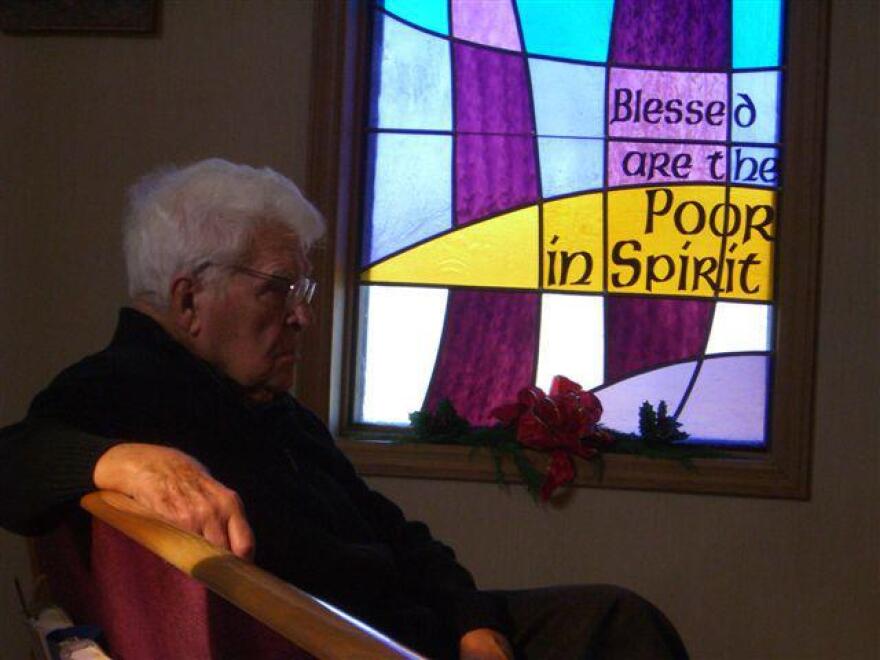The Roman Catholic missionary who founded the Christian Appalachian Project passed away yesterday. Since World War Two, Monsignor Ralph Beiting served the people of eastern Kentucky through a series of social service programs. WEKU’s Charles Compton, who knew the Catholic priest, has this appreciation.
At first, the Reverend Ralph Beiting didn’t want to come to Appalachia. As a seminary student, well before joining the priesthood, Beiting argued the point with his bishop. The northern Kentuckian said his family needed him, but, the Bishop was boss and somewhat intimidating, so the student found himself working that summer in Paintsville.
“I saw things that summer that I had never realized were possible. I found out that there was another America…the America of Appalachia. I found poverty that I have never seen, even in the Great Depression, and I saw prejudice from one church against another, that had never recognized or seen before,” said Beiting during an interview with NPR’s Storycorps.
A few years later, in 1950, Father Beiting was sent to Madison County to launch a church there. The young missionary’s welcome was not warm. A neighbor circulated a petition demanding an expulsion of the Catholic Church from Berea.
“He didn’t want the property values to go down and he was sure that if it was a Catholic church there, they would,” said Beiting.
In Berea, there was no building, no money and just a half-dozen Catholics. Beiting wanted to go home, but, late one night, during prayer, the catholic priest changed his mind.
“As I describe it, that is the day I lost my mind. I no longer was going to think as a human folk. I was no longer going to try to ration things out, according to the sensible way. I was going to put my hands in the hands of God, and I was going to go wherever he left me,” said Bieting.
Beiting continued his mission work, building churches, spreading the faith and raising money. At night, Beiting would comb telephone books from Chicago, Philadelphia and New York, looking for Irish, German and Italian households and mail them appeals for cash.
He began to realize fighting evil in eastern Kentucky meant fighting poverty. That revelation came to him as an employer. When building churches, Beiting often hired local laborers. One day, the priest was invited to a worker’s home, to see his newborn child.
“So he takes me into this little shed and takes me over in the corner, and he said, `Ain’t it a purty thing?’ And I said, `Oscar, it’s a beautiful little baby. But, why do you have it in this wire cage, with little, fine chicken wire surrounding it?” He said `Well, so, the rats won’t eat on it.’ And I began to understand something of poverty,” said Beiting.
In the 1950s, Beiting launched a fully-integrated summer camp for boys. By 1964, his ministry had evolved into the Christian Appalachian Project. CAP, as it’s often known, is interdenominational, non-profit organization that serves Kentucky’s mountain residents.
A warehouse and thrift store in Louisa also bears his name. The center distributes food, clothing and furniture, and provides four thrift stores with low-cost merchandise. In his final years, Beiting worked with the residents of Martin County.
An early collaborator was Father Terence Hoppenjans, who still serves in eastern Kentucky.
“When people are in need they ask him for things and he goes out and gets them for them, whether it be a car, or whether it be a refrigerator, whether it be whatever it might be. His generosity is such that he is always concerned about others, not just himself. And that’s one of the things that has impressed me and has encouraged me as well to try to emulate and to try to follow that example,” said Hoppenjans.
In 2009, when celebrating 60 years as a priest, the Monsignor talked about his legacy. Beitingasked the faithful to continue his work after his death. He said, "We have to be an answer to Appalachia. We can never let the poor go untended."


